A parent’s goal is to remain ever vigilant of their child’s health and well-being. After all, nothing hurts quite like seeing your child experience pain or discomfort. General illness or small physical injuries, while alarming, are usually simple enough to mend. However, what if your child is suffering from an ailment you can’t see?
Hearing loss is difficult to identify, especially in infants and toddlers. To detect hearing impairments early on, many states require newborns to undergo hearing testing between birth and 3 months of age. Even if your child’s initial hearing screening showed no signs of hearing loss, children may still exhibit symptoms later in infancy or the toddler years. This is why a parent must remain attentive to the various signs of hearing loss. For instance:
- A newborn baby with hearing loss may not startle at the sound of loud noise, but are more likely to respond to noises resulting in felt vibrations.
- Older infants may show no reaction to familiar voices or sounds.
- Toddlers should be able to understand and use simple words/expressions. Not doing so may indicate a possible hearing impairment.
Other symptoms to look for include:
- Pulling or rubbing of ears
- Unexplained irritability
- Fever
- A delay in speech development
- Making sounds that taper off
- No response when a child’s name is spoken
Remember, early detection is key to slowing, stopping, and possibly reversing hearing loss. If your infant or toddler is exhibiting any of the above symptoms, please consult your family doctor immediately.
For more information regarding your toddler or infant’s hearing health, sign up below to download our Signs and Symptoms of Hearing Loss in Children ebook.



